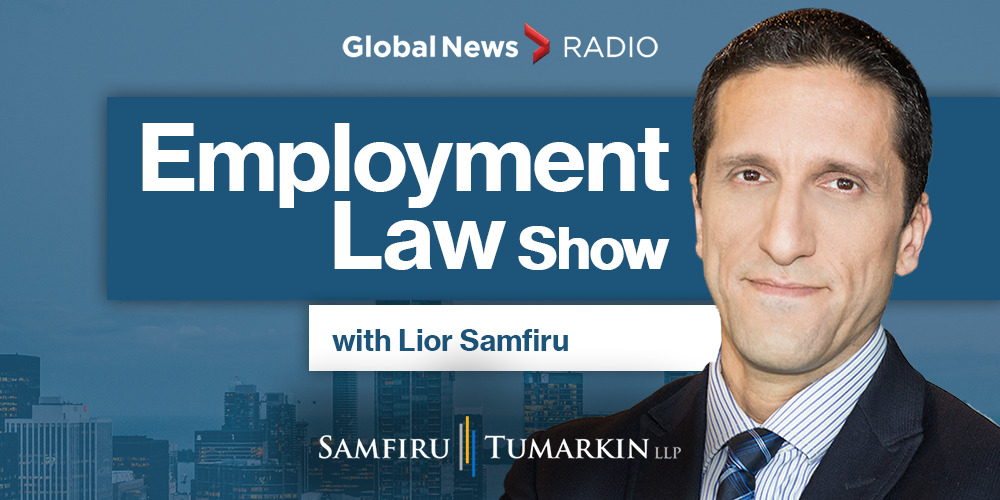Employment Law Show 640 Toronto – S10 E13

Episode Summary
Deadlines for employer vaccine mandates, changes to non-compete legislation, working notice, and more on Season 10 Episode 13 of the Employment Law Show on Global News Radio 640 Toronto.
Listen below as Employment Lawyer Lior Samfiru, Partner at Samfiru Tumarkin LLP, reveals your workplace rights in Toronto, the GTA, Hamilton, London, and across Ontario on the Employment Law Show. Lior shatters myths and misconceptions about severance pay, terminations, workplace harassment, overtime pay, wrongful dismissal, constructive dismissal, duty to accommodate, independent contractors, and more.
Listen to the Episode
Episode Notes
If the Ontario government gets rid of vaccine mandates, what does that mean for employers that have vaccine mandates, or who have suspended or let go employees?
The short answer is that it does not change anything for these individuals, because ultimately an employer is going to decide for themselves whether they are going to have a vaccine policy or not. They don’t have to follow what the government does with respect to vaccine mandates. That means that if you are still working for an employer who wants you to be vaccinated, and you’re not, you will most likely still lose your job. Keep in mind, however, that you will still be owed severance. Your employer is not legally able to let you go without paying you severance, which could be as much as two years’ pay.
My employer has a vaccination policy and the deadline is February 28. I don’t want to get vaccinated. What can I do?
The reality is there’s not much that you can do in terms of your employment status other than getting the vaccine. Unless your employer decides to change their mind or extend the date, they will let you go or put you on a leave, if you don’t get the vaccine. There’s no way to physically prevent your employer from letting you go. Whether they put you on a leave or let you go, they have to pay you severance. They’re not going to just write you a severance check, we are going to need to push back to get you that severance. But legally they’re required to pay it.
I have an employment agreement from four years ago that has a non-compete clause. I understand there were changes to the legislation – does that apply to me?
The changes to the legislation really applied to agreements that came into effect after October of 2021. If you signed an employment agreement before October 2021, then the new changes in legislation don’t help you. But that said, regardless of the legislation, what our courts have said is that most non-compete agreements are not enforceable unless you’re an executive or in a very specialized position. That means that the non-compete clause in your employment agreement may not be enforceable. But before you take a job with a competitor, it’s important to have that agreement reviewed by an employment lawyer at my firm.
My company may start laying off employees. What would I be owed under the Employment Standards Act?
The ESA only outlines your minimum entitlements to severance – and that’s irrelevant. Since you’ve worked for your employer for 15 years, you’re looking at a minimum of 12 months’ severance. It could be up to 14 months’ severance. If you’re part of a union, you would be owed 23 weeks in severance.
My manager recently gave me a warning for being one minute late for work and threatened to fire me. What can I do?
Keep in mind your employer can let you go for any reason, but they would have to pay you severance. You would have to commit serious misconduct for them to be able to let you go without severance. If you think this is a minor infraction you’ve committed, you could write an email and explain that you are confused by the warning and that no one has ever had a problem with your performance in the past, and you would appreciate them telling you if things have changed. You can also explain that you will be on time going forward. If you do that you will make it a lot harder for them to let you go.
My company closed on December 31, 2021. I was informed of the closure in January of 2021. When the company closed, I received one years’ severance. Was that correct?
The notice that you get counts towards your severance. So, if you’re owed two years’ severance, but you get a years’ notice, you’ve already received half your severance. In your situation, you have received two years’ pay – a combination of 12 months’ notice and 12 months’ pay.
LEARN MORE
• Employee Rights When a Company Closes
I’ve been working part-time for two years, and recently my employer started withholding part of my paycheck. Can they do that?
They can’t withhold an employee’s pay – that’s not allowed. The best thing you can do is tell them that unless they pay you the money they owe you, you’re going to file a claim with the Ministry of Labour. Usually, that’s enough to resolve the situation. If you have to, you can file a claim with the Ministry of Labour, because it’s completely illegal to hold back money without your written consent. They have to pay it to you.
My company is about to start laying off employees. If I’m let go, does my severance package include my bonus?
Your severance package will likely be between 18 to 20 months’ pay, based on your age, your position, and your length of employment, and it should absolutely include your bonus. Typically, you would look at the three-year average of your bonus, and that figure is used to calculate your severance.
LEARN MORE
• Bonuses and Severance Pay
• Are you entitled to your bonus after termination?
I volunteered at an IT company, and they offered me a full-time job. Later they told me the job wasn’t available, but I had already turned down another job offer. Do they owe me anything?
The key here is the fact that because you believed you had this job, you turned down another job. Because of that, they owe you compensation, probably three months’ pay, for revoking the job offer after you turned down another job.
Top 5 Things an Employee Should Never Do
#1) Never make assumptions about your legal rights or get information from the wrong sources
You have to be careful where you get answers to your employment law questions, and where you find out your legal rights. You should not be relying on some guy posting on Facebook, or your Uncle Bob, for legal advice. Employment law is important. You have rights, and they’re very good rights. We have some of the best employment laws in the world in Canada. But if you make assumptions, or get your advice from the wrong source, you won’t know what those rights are.
#2) Never accept significant changes to the terms of your employment
If your employer imposes changes to terms of employment, for example, if they reduce your pay or they change your hours or they demote you, do not just accept it. The problem with accepting those changes is that you will have given the company the right to do it again, repeatedly. You can choose to treat that change as a constructive dismissal. Constructive dismissal means that you are treating it as a termination, and your employer has to pay you severance.
#3) Never accept a verbal termination
The problem with a verbal termination is that the company can turn around and say that you resigned. If you’re called into a meeting and let go verbally, once you leave the meeting send your boss an email confirming the date and that they let you go. That solves that problem.
#4) Never resign if you don’t really want to unless you have something in writing
Resignation is something that you do voluntarily and unilaterally. So many times, an employer may say to you “I expect your resignation in the morning” or “You have two options: we’re going to let you go or you’re going to resign.” In any of those situations, your answer should be “I’m staying here until you tell me not to.” Do not resign, because if you resign, you may be giving up your legal entitlements to severance or employment insurance. You don’t get either if you resign. Some people believe that there is some big database somewhere that keeps a record of whether you were let go or you resigned, but that’s not true. There’s no reason to think that it’s better to resign than to be let go.
#5) Never call the Ministry of Labour if you’ve lost your job
The Ministry of Labour cannot advise you on your full entitlements. They can only advise you with respect to your minimum entitlements. They cannot advise or enforce your full entitlements, and that’s all that really matters. If you’re let go, the last thing you can or should do is contact the Ministry of Labour, because you’ll get the wrong information. If you want to find out how much severance you’re actually owed use our severance pay calculator.




